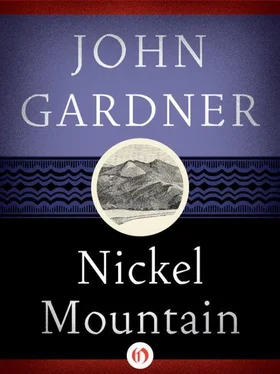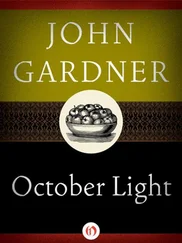He closed his eyes. None of that was true.
Now the train started up, so smoothly that, as always, it seemed at first the station that was moving. And still he was unable to read. He couldn’t stop hearing the mumble of the wheels, steady and endless as banjo music, or watching the snow hitting the window to his right and sticking to the pane. He watched the gray buildings of Albany flitting past beyond the snow, then smaller houses with Christmas trees, then hills, luminous in the twilight, then the houses and crossings of small towns. The train stopped often, and passengers got on or got off, the same thing again and again, as in a nightmare: the murmur of voices, the glimpses of waiting or hurrying figures, the woman from the Salvation Army with her bell, the snow beating endlessly at the window. At last, entering the mountains — the train seemingly hanging suspended in darkness, then jolting suddenly, swaying on a curve — the churning in his stomach settled a little. He read for thirty minutes, then dozed and dreamed he was a child riding beside his father on the bobsled, hauling in wood. The dream was pleasant at first, but little by little it changed until at last, looking up at his father, he realized that though he sat erect, his hat seemingly brushing the stars, he was dead. He awakened with a start and for an instant thought the train was falling into some wide, deep gorge. When the brief panic subsided, he pressed his face to the window, raising his hands to the sides of his forehead like blinders, and saw snow and dead-looking trees standing in a desolate lake. He leaned back in his seat, his stomach churning so badly now that he thought he might have to vomit.
Except for the flickering red globes over the doors, the car was dark. As he looked, the conductor opened the door, letting in the suddenly loud rumble of the wheels, and called, “Utica, twenty minutes.” He came through the car, swaying, light blanking out the lenses of his glasses, and when he reached Willard’s seat he leaned toward him, his face chalk-white, and said again mechanically, “Utica in twenty minutes.” Willard nodded with a jerk, as though he had not registered at first. He thought again, “All I have is two dollars,” and sat rigid, shivering in the cold, his lips pressed together tightly, until he saw the lighted tar paper and asbestos fake-brick shacks at the outskirts of the city. He got up then, reached his suitcase down from the rack, and worked his way to the door. He felt the others watching him, and hurried.
As he stepped down between the two cars the wind snatched at him as if to tear him away from earth and bear him off into the void, but he caught hold of the cold doorpost and, clinging to it, pressing down the skirt of his overcoat with the side of his suitcase, stepped onto the platform and into the shelter of the building. On the train steps the wind had been fierce, but under the overhang there was a lull. He put down the suitcase and drew a deep breath of the cold, snowy air, and standing not far from the door he looked around the platform and the lighted station. The storm whistled between the wheels of the car, through the metal scaffolding, and around the corner of the building. A mail wagon creaked past him, barely missing the corner of his suitcase, and men moved back and forth, laughing and talking, in snowy coats and hats. Beyond the corner of the station men and women piled suitcases into waiting cars, shouting through the snowy darkness. The big doors behind him swung open and shut continually, and muffled figures darted by covered with snow. An angry voice shouted, “Which car for Batavia?” and he caught a brief glimpse of a bearded, scarred face. Then steam hissed, billowing around the wheels of the train, and the cars began to move. He glimpsed faces in the windows. Then suddenly he was looking at the tracks beyond and covered walks and signal scaffolds and darkness. When the swaying red light of the last car was swallowed up by the night, he turned to go in.
In the huge vaulted room there was no one he knew. People sat solemn-faced and bored on the pew-like benches, not talking, bundled in their coats and scarves. There was a two- or three-year-old boy in a snowsuit lying asleep beside a fat woman, and for an instant Willard’s chest went light.
He was thinking of his illegitimate child, whom he’d never seen. He wondered uneasily whether he would see him this time. He looked away. Across the room there was a green metal rack of newspapers. He hurried over to it, running from one painful thought to another — from the child to the Bomb. Willard Freund inclined more and more to believe — though at times he knew it was foolishness — that the stupidity of mankind, and maybe especially the stupidity of American democracy, was going to destroy the world — and soon. Though normally he was shy, not talkative, more times than once he had gotten a little drunk and had talked about it with fraternity brothers at Albany, sitting in the dimly lit lounge with a stack of 45’s on the changer — Tchaikovsky’s Pathétique, Stan Kenton’s Innovations —a cigarette hanging un-lighted between his lips, head and shoulders thrown forward (image from some movie, Marlon Brando, maybe) — had teased the thought toward probability, half-aware as he spoke that his loss was more personal than he was telling them. His father’s barn was the largest in the county, vaulted above like an airplane hanger, the cowbarn, below, as long and wide as a gymnasium. His father’s hired men moved in and out between cows like factory workers, shifting milking machines, throwing open the chutes that brought down hay, or moving the milkcans on stainless steel wagons to the cooler. He had told his father the girl was pregnant, he intended to marry her. His father had laughed, then looked at him hard, and then, without warning, had slapped his face. “Don’t mix up pussy and business,” he’d said, and Willard Freund had been filled with rage and shame — because it was true, he did not love her, though the sight of the Stop-Off made him ache with desire till Henry Soames’ filthy shanty and diner, once for him a haven against the mechanized, cold-blooded, money-grubbing evil of W. D. Freund and Sons Dairy Farms, had become what it looked like to the casual eye, a seedy, rundown dingle of temptation and witchcraft. Stinging with rage, he’d snatched off the nearest milkcan cover and had thrown the can on its side so the milk came gushing out, thick and steaming. His father had bellowed and backed away a step, afraid of him, and Willard, crying now, had fled from the barn. He might have won, if he’d pushed, exactly as, later, he’d won the right to quit Ag school and become an English major. But he’d gone back to Cornell, had gone on getting letters from her, and, sick with indecision, had done nothing. Though he profoundly hated his father for it, his father was right: The God-spouting, hymn-singing, ne’er-do-well Welsh were not his kind of people. So he was ashamed of himself, yes; shocked at himself. But he talked drunkenly of politicians, kings of self-interest, and businessmen, shallowest, coarsest of men. And as he talked — he who had been all his life so quiet — he had thought, in horror, of his friend or once-friend Henry Soames, eccentric hermit, how Henry would sometimes get carried away and start babbling like a madman or drunkard. People smiled, made a circle in the air beside their heads, said: “Bonkers.” Suddenly, remembering Henry Soames, Willard would stop talking, would pull at his upper lip (that too he’d gotten from Henry), and would bite his lips together and squint. “Freund, what’s really eating you?” some fraternity brothers would occasionally ask. Though they talked day and night about their sexual conquests, he couldn’t tell them. He’d told at Cornell, when he was there, and it was horrible. I want to be a child again, he thought.
Читать дальше











